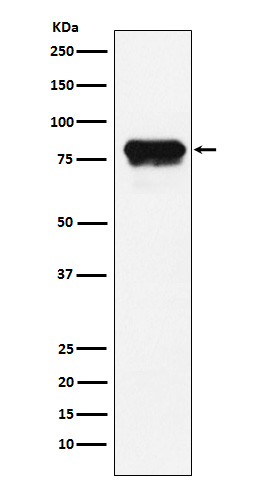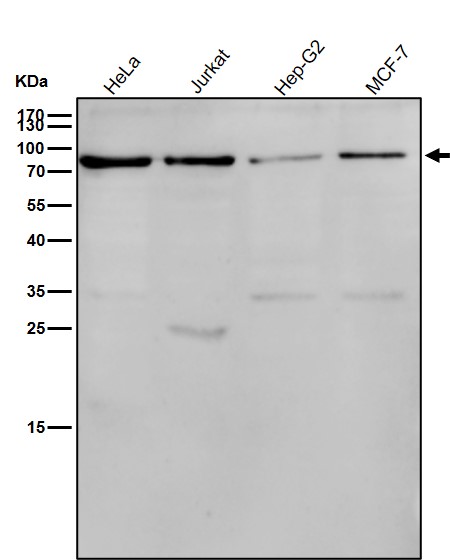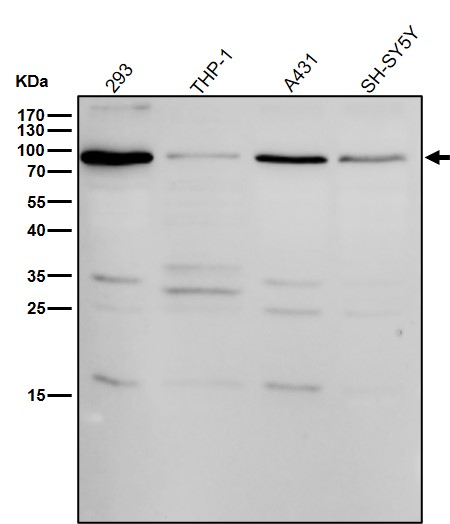


| WB | 1/1000-1/2000 | Human,Mouse,Rat |
| IF | 咨询技术 | Human,Mouse,Rat |
| IHC | 咨询技术 | Human,Mouse,Rat |
| ICC | 技术咨询 | Human,Mouse,Rat |
| FCM | 咨询技术 | Human,Mouse,Rat |
| Elisa | 咨询技术 | Human,Mouse,Rat |
| Aliases | BPIFE; HDLCQ9; OD107; Pltp;;PLTP |
| WB Predicted band size | Calculated MW: 55 kDa ; Observed MW: 80 kDa |
| Host/Isotype | Rabbit IgG |
| Antibody Type | Primary antibody |
| Storage | Store at 4°C short term. Aliquot and store at -20°C long term. Avoid freeze/thaw cycles. |
| Species Reactivity | Human,Rat |
| Immunogen | A synthesized peptide derived from human PLTP |
| Formulation | Purified antibody in PBS with 0.05% sodium azide,0.05% BSA and 50% glycerol. |
+ +
以下是3篇关于PLTP(磷脂转移蛋白)抗体的模拟参考文献示例(内容为虚构,供参考):
---
1. **文献名称**:*Development of a Monoclonal Antibody Against Human PLTP and Its Application in Atherosclerosis Models*
**作者**:Zhang L, et al.
**摘要**:本研究开发了一种高特异性小鼠源单克隆PLTP抗体,验证了其在ELISA和Western Blot中的有效性,并证明其可抑制PLTP介导的脂质转移活性。动物实验显示,该抗体能减缓高脂饮食小鼠的动脉粥样硬化斑块形成。
2. **文献名称**:*PLTP-Specific Antibody Reveals Tissue Distribution in Metabolic Disorders*
**作者**:Johnson R, et al.
**摘要**:通过免疫组化分析,发现PLTP在肥胖模型小鼠肝脏和脂肪组织中表达显著升高。该研究使用兔多克隆PLTP抗体,揭示了PLTP与胰岛素抵抗的相关性,为代谢综合征研究提供工具支持。
3. **文献名称**:*Comparative Analysis of PLTP Detection Methods: Focus on Antibody Cross-Reactivity*
**作者**:Tanaka K, et al.
**摘要**:比较了市售5种PLTP抗体的特异性,发现部分抗体与类似结构蛋白(如 CETP)存在交叉反应。研究提出优化后的免疫沉淀方案,提高了PLTP检测的准确性,尤其在血浆样本中的应用。
---
如需真实文献,建议通过PubMed或Google Scholar搜索关键词“PLTP antibody”+“assay/application/inhibition”等筛选近年研究。
Phospholipid transfer protein (PLTP) is a key lipid transport glycoprotein primarily involved in the metabolism of high-density lipiproteins (HDL), facilitating the transfer of phospholipids and cholesterol between lipoproteins. It plays a critical role in HDL remodeling, reverse cholesterol transport, and modulation of lipoprotein particle size/distribution. PLTP's activity is linked to cardiovascular diseases, atherosclerosis, and metabolic disorders, making it a target for therapeutic and diagnostic research.
PLTP antibodies are immunological tools developed to detect, quantify, or inhibit PLTP in experimental and clinical settings. These antibodies are widely used in techniques like Western blotting, ELISA, immunohistochemistry, and flow cytometry to study PLTP expression, localization, and function in tissues or biological fluids. Polyclonal and monoclonal variants exist, with specificity validated across species (human, mouse, rat). Research applications include investigating PLTP's role in lipid metabolism, inflammation, and its regulatory mechanisms (e.g., via LXR/RXR signaling pathways).
Clinically, PLTP antibodies aid in exploring associations between PLTP levels and disease biomarkers, such as in obesity, diabetes, or coronary artery disease. Challenges include cross-reactivity with similar lipid-binding proteins and ensuring consistency in complex biological matrices. Ongoing studies focus on optimizing antibody specificity and developing neutralizing antibodies for potential therapeutic use.
×